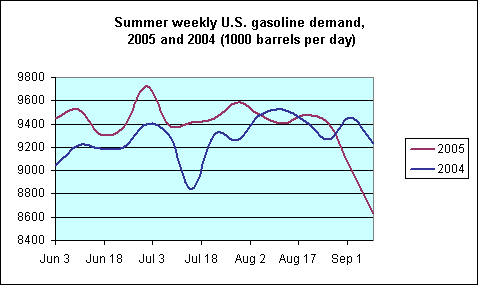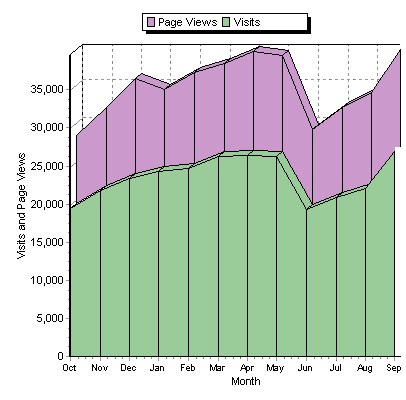Via Lynne Keisling of the Knowledge Problem comes two good articles on supply and demand in the gasoline markets.
The first is from James Hamilton, who analyzes the effect of gasoline price increase on demand and finds, amazingly to some I guess, that demand has fallen substantially.

We have certainly seen this in the camping and travel business, as visitation has fallen off the map of late, though fortunately it comes right at the end of the season. It appears that demand has fallen about 10% with the increase to circa $3 gas, about matching the shortfall in US refining capacity post-Katrina. Does anyone doubt that we would have seen gas lines had prices not risen?
The second article is from Steve Chapman. Apparently, Democratic senators are separately working to make sure that higher oil prices are not allowed to spur either lower demand or higher supply. First he takes on serial-stupid-statement-making Maria Cantwell who is working the demand-side with her desire to have the US President set retail gasoline prices:
This week, as gasoline prices remained above $3 a
gallon, [Maria Cantwell] proposed giving the president the power to tell retailers
what they can charge at the pump.
A lot of people grew anxious
seeing long lines forming last week, as motorists rushed to fill their
tanks in the aftermath of Hurricane Katrina. But Cantwell apparently
enjoyed the sight well enough that she'd like to make those lines a
permanent feature of the landscape. If so, she has the right approach.
The government does many things badly, but one thing it knows how to do
is create shortages through the vigorous use of price controls.
That's what it did in the oil market in 1979-80, under President Jimmy
Carter. He was replaced by Ronald Reagan, who lifted price caps on gas
and thus not only banished shortages but brought about an era of low
prices.
Cantwell thinks oil companies have manipulated the
energy market to gouge consumers, though she is awaiting evidence to
support that theory. "I just don't have the document to prove it," she
declared. Her suspicions were roused when she noticed that prices
climbed in Seattle--though most of its oil comes from Alaska, which was
not hit by a hurricane.
Maybe no one has told Cantwell that oil
trades in an international market, and that when companies and
consumers in the South can't get fuel from their usual sources, they
will buy it from other ones, even if they have to go as far as Prudhoe
Bay.
If prices rose in Dallas and didn't rise in Seattle, oil
producers would have a big incentive to ship all their supplies to
Texas--leaving Washingtonians to pay nothing for nothing. When a freeze
damages Florida's orange juice crop, does Cantwell think only
Floridians feel the pain?
Then, he turns his attention to Senator Dorgan, who wants to make sure we get no new oil supplies by having the government confiscate "windfall profits"
Sen. Byron Dorgan (D-N.D.), meanwhile, was outraged by
the thought of giant oil companies making money merely for supplying
the nation's energy needs. He claimed they will reap $80 billion in
"windfall profits" and wants the government to confiscate a large share
of that sum through a special federal tax.
But the prospect of
occasional "windfall" profits is one reason corporations are willing to
risk their money drilling wells that may turn out to be drier than Alan
Greenspan's reading list. Take them away, and investors may decide
they'd rather speculate in real estate.
Speaking of real
estate, Americans seem to feel no moral compunction about getting rich
from unforeseen increases in the price of another vital necessity. You
think home sellers in Baton Rouge haven't raised their asking prices in
the last 10 days? You think Dorgan wants to tax their windfall?
It's hard to see why oil companies shouldn't make a lot of money when
the commodity they provide is suddenly in short supply. After all, they
are vulnerable to weak profits or even losses during times of glut.
Back when Americans were enjoying abundant cheap gasoline, the joke was
that the surest way to make a small fortune in the oil industry was to
start with a large fortune.
Oil companies are also subject to
the whims of nature. No one is holding a charity fundraiser for the
businesspeople whose rigs and refineries were smashed by Katrina. No
one will come to their aid if prices drop by half.
Maybe Senator Dorgan can go back and confiscate the windfall profits that Maria Cantwell made in the Internet Bubble, where she made a fortune cashing out to later investors who took a bath. At least oil companies are creating value with new oil production with their windfall profits:
Calgary"” Penn West Energy Trust is holding
a huge land sale -- looking to sell exploration rights to more than
500,000 hectares of undeveloped territory in Western Canada -- and the
offering has stirred a frenzy among many oil and natural gas companies
hungry for new drilling options.
"Demand is phenomenal," said Moya Little, president of Western
Divestments Inc., the firm brokering the sale. "It's a wide spectrum of
companies, startups, majors, any company that needs to drill."
And more here:
The world's biggest oil producers have significantly
boosted investment in oil exploration for the first time in nearly two
decades.
The Organisation of the Petroleum Exporting Countries,
the cartel controlling 75 per cent of the world's oil reserves, on
Monday revealed its most important members had drilled 7.5 per cent
more wells last year than in 2003 in response to the oil price boom.
Opec's annual statistical bulletin also showed that the number of rigs
in operation within the 11-member cartel rose 18.8 per cent last year
after dropping by almost 6 per cent a year earlier.
What useful purpose is Cantwell using her windfall Internet stock profits for, other than financing her own run for the Senate? Could the Democratic Party be any more clueless about economics? Jeez, why is it that our opposition party in this country has to be such a joke?
Technorati Tags: Economics, Energy

